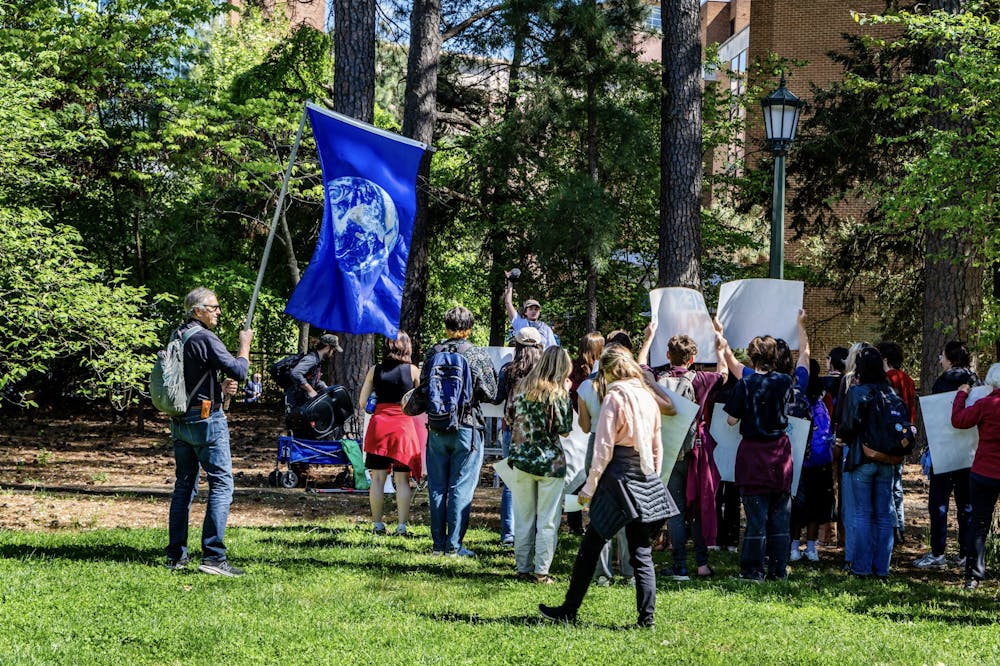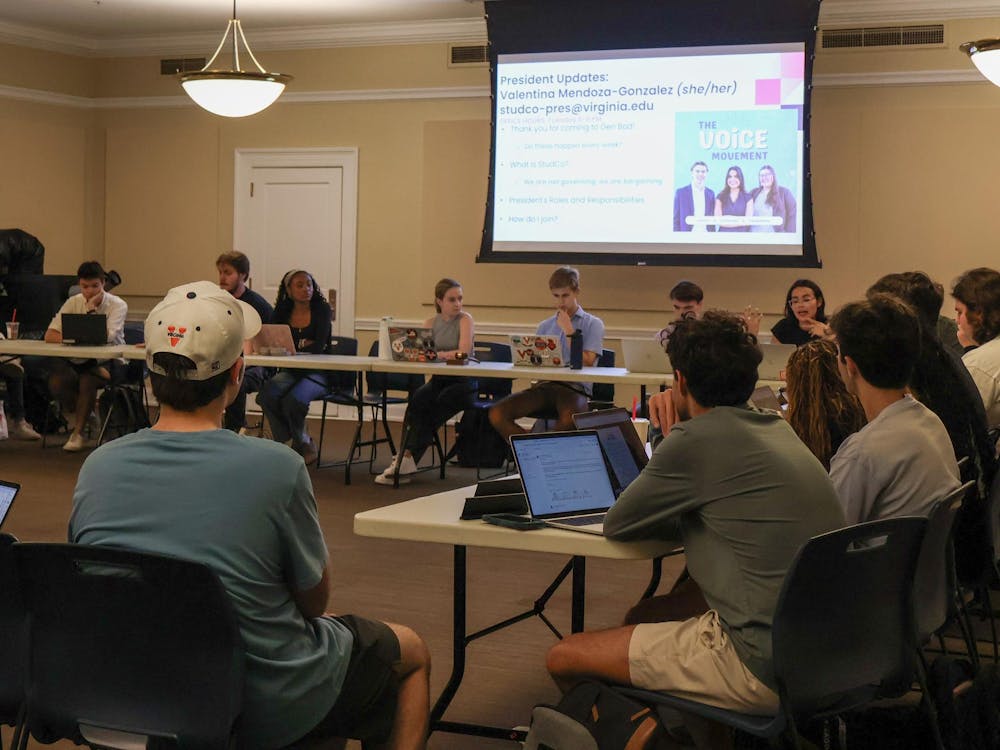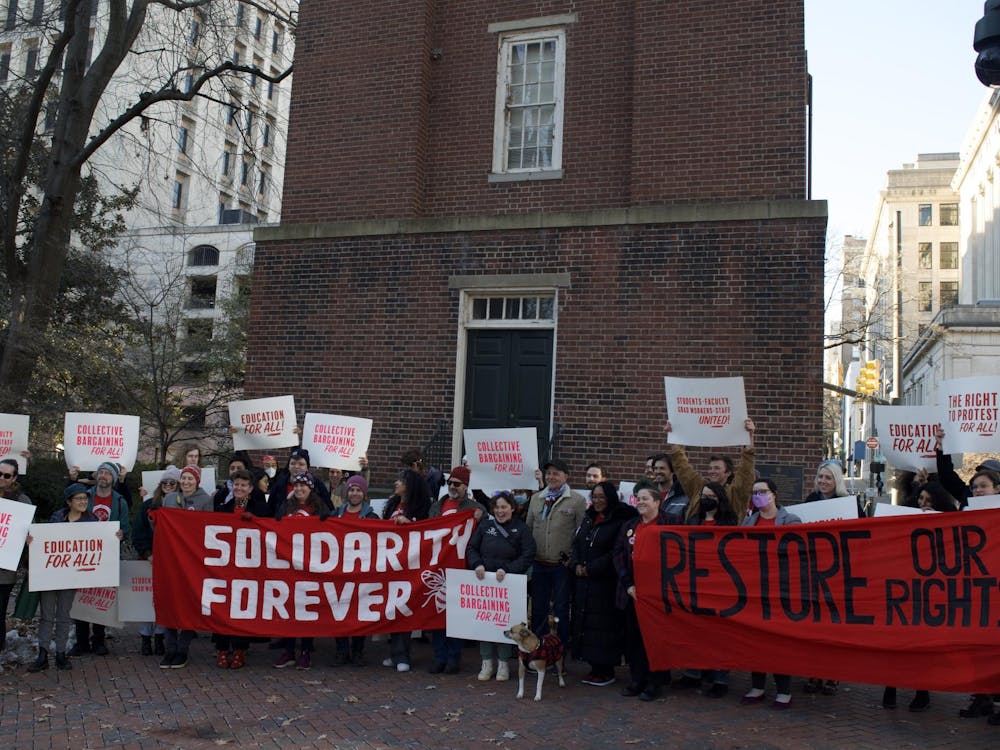Fossil Fuel DivestUVA hosted a rally titled “Reclaim Earth Day” Monday, calling for the University to completely withdraw their investments from the fossil fuel industry. The rally began on the North side of the Rotunda from which around thirty people, including University students as well as Charlottesville community members, marched to the Corner next to the University heating plant off West Main Street. Next to the heating plant, two climate activists — Joshua Vana and Deborah Kushner — gave speeches on their work with environmental justice in Virginia, including their advocacy for the cancellation of the Atlantic Coast pipeline.
The rally was jointly hosted by Third Act, an organization of Americans over sixty years old who help to safeguard the climate and democracy, and ARTivism Virginia, an organization of artists and activists working for environmental justice. Deborah Kusher is a representative from Third Act, while Joshua Vana is the director of ARTivism Virginia.
Part of Fossil Fuel DivestUVA’s mission is increased communication between the University and students on where its $13.6 billion endowment is being spent in relation to fossil fuels. Cristina Racanelli, co-organizer of the rally and third-year College student, spoke about the organization’s mission and detailed what divestment from fossil fuels by the University would entail in a speech before the march on the steps of the Rotunda.
“There’s no denying that the burning of fossil fuels contributes significantly to climate change,” Racanelli said. “We will be demanding from U.Va. complete divestment from fossil fuels, which includes full disclosure of our fossil fuel divestment and portfolio transparency.”
According to University Facilities Management, the University’s district heating plants, which are located just east of the University Health West Complex, use nearly 1.3 trillion British thermal units of fossil fuels such as natural gas, oil and coal to provide 84 percent of the heating energy used at the University. As of 2023, the University only uses around 15 percent of electricity powered by renewable sources such as solar power.
Racanelli stood alongside Emma Swofford, chair of Fossil Fuel DivestUVA and third-year College student, and they said two effects of the climate crisis include extreme natural disasters and a disproportionate impact against marginalized communities. According to Racanelli, divestment away from fossil fuels should only be the first step towards sustainability made by the University.
“Divestment would start with more transparency … then also investing in environmental justice initiatives and renewable energy,” Swofford said. “I think U.Va. is doing a good job at that, but at the same time it’s difficult when they’re also investing millions into fossil fuels.”
Fossil Fuel DivestUVA affirmed its belief that the University is failing to support sustainability after it filed a legal complaint Monday with the Virginia attorney general. The complaint challenges the legality of the University investing in fossil fuels and states that it has violated its legal obligation to invest in the community’s interest. Other schools, like Columbia and Tulane Universities, also filed complaints with the attorneys general of their respective states. There is no information on the timeline of the legal complaint as of now.
Kushner and Vana also spoke about their climate activism during the rally, particularly in relation to opposing the construction of the Mountain Valley Pipeline, a 42 inch diameter natural gas pipeline system which stretches approximately 303 miles from northwestern West Virginia to southern Virginia. According to Kushner, the MVP poses a specific threat to Virginia’s landscape.
“The MVP is a focus for us because it’s here in Virginia,” Kushner said. “It continues to devastate the landscape of water, the land, the community and the destruction of vital Appalachia.”
Construction of the MVP began in 2018 and was 94 percent complete as of spring 2023. Opponents of the pipeline have brought forth legal challenges which made their way to the Supreme Court last summer, where the court ruled in favor of continuing construction of the pipeline. Kushner said that the MVP has harmed numerous parts of the environment, listing specific streams that would be negatively affected by its construction.
“The Mountain Valley Pipeline runs right through [Bottom Creek in Roanoke County] in multiple places,” Kushner said. “The sheer act of constructing it has decimated that stream, a crime against nature.”
Vana also spoke extensively on the fight against the MVP, including successes of activists and the recent setbacks with the Supreme Court decision to permit construction. Speaking to the students in the audience, he said they should not be deterred by institutions such as University of Virginia Investment Management Company who try to delay and discourage action to a later date.
“[Institutions] will tell you that you’re the leaders of tomorrow, which I’ve always found really patronizing,” Vana said. “I would argue, in fact, that folks like you are the leaders of today.”
Second-year College student Zaniya Trotman, who attended the event, said that she thought the rally was extremely important and that the University has a duty to listen to students’ voices and opinions related to climate activism.
“I think what the University can do first and foremost is listen … to see what’s most beneficial to students and also those in the community,” Trotman said.
According to Fossil Fuel DivestUVA’s Instagram, the organization plans to send a letter to University administration with the group’s demands for divestment after garnering signatures from students.






